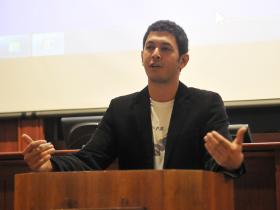Cairo on the ground Sharif Abdel Kouddous
Sharif Abdel Kouddous Different journalists, different stories. American mainstream reporters, perched at high up windows overlooking Tahrir Square, experienced in combat perhaps, saw the Wednesday violence as a burgeoning war, and knowledgeably evaluated the weaponry used ("that's an AK-47, I'm sure") and the possibilities of escalation. Their information was good, their analysis at home often astute (I'm thinking of Rachel Maddow, not Bill O'Reilly). but their remarks have often seemed speculative and ready to shift when they see which way the wind blows. Contrast this with the coverage of Al Jazeera English and Al Jazeera Arabic, their headquarters off in the Gulf, local offices forcibly shut down, but constantly interviewing beleaguered English-speaking reporters, their names not mentioned at times to protect them from being attacked, or in the case of Al Jazeera Arabic, all kinds of informants, from a demonstrator about to leave the vast popular Cairo neighborhood of Shubra to the head of a lawyer's union. Al Jazeera in both versions is at one remove, but has a broad sweep, and enjoys unprecedented influence and connectedness in and with the Arab world.
Meanwhile a view both rosier and more intimate has been provided by Democracy Now! producer Sharif Abdel Kouddous, a young Egyptian who went to college in the US and lives in Brooklyn now. Sharif arrived back in Cairo, where he grew up, just as the demonstrations began, and instantly blossomed from a somewhat stolid occasional anchorman on Amy Goodman's news hour into an impressively poised reporter. Obviously sympathetic to the revolutionary spirit in the air, Abdel Kouddous, who has written for
The Nation and issued tweets every waking hour since he got there, has described the scene in Tahrir Square as "celebratory." He has noted that when there was a chant of the Muslim battle cry, "
Allahu akbar" (God is great), the crowd countered and drowned it out with "
Muslim, Christian, we are all Egyptian." He has constantly remarked at the way people are helping each other with food and snacks, old, young, rich, poor, and all political persuasions are present fighting for a common goal, the fall of the regime, the removal of Husni Mubarak -- a possibility that fills the millions with an amazing surge of energy and hope. Everybody is pulling together, he has emphasized, and there is a spirit of togetherness that means this is a new Egypt, one he never saw in his life up to now -- Mubarak came into power when he was three; one that has replaced the old one forever.
Of course Abdel Kouddous has not pretended that the ugliness of the long brutal clashes of intifada and
baltagiyya, the Molotov cocktails, marauders on camel and horseback, live ammunition, rocks and knives that have killed a hundred or more and injured perhaps thousands, didn't happen. In fact Friday morning Democracy Now! aired his most remarkable
report thus far, in which he surveyed the rubble after several days of clashes between the pro- and anti-Mubarak camps. What this film shows is that he enjoys, so far anyway, unparalleled access to events on the ground. It showed him leaving an apartment, going down the old Cairo elevator, driving over the Qasr el Aini bridge by car and then being frisked by a young guard to the Tahrif area who said "Sorry, sorry!" for having to search him; after that visiting a makeshift hospital, talking to people, and viewing the dangerous semi-combat zone just outside the barricades surrounding the square. Fighting was still going on. A man yelled about the stupidity of the opposition. Abdel Kouddous interviewed mostly people who spoke English, but when they spoke Arabic, he translated with a natural immediacy, a casualness almost, that only a local could have who has one foot in Egypt and the other in America. No coverage I've seen has been this close to events on the ground, this intimate, and this intimately knowing. He has said, and it's clear, that it's more dangerous outside and around Tahrir than inside it, at least when the protesters are present in safe numbers. In fact when he and the UCDavis Comparative Literature professor Noha Radwan reported from a building away from the square, she was accosted and beaten by thugs on her way somewhere else.
This clear-headed, intimate report points out the big weakness of Al Jazeera. High profile as they are, and resented by the repressive regimes all over the Arab world, they have been targeted, and though they report non-stop, and Sharif's piece lasted only a few minutes, they are never as close as he was able to be. That moment may have passed, though we hope not. That film was shot earlier. Sharif's report for Democracy Now! for today was by telephone, since he could not reach the television building from which Democracy Now! had broadcast before. Nonetheless this morning was a glorious moment for independent media.





